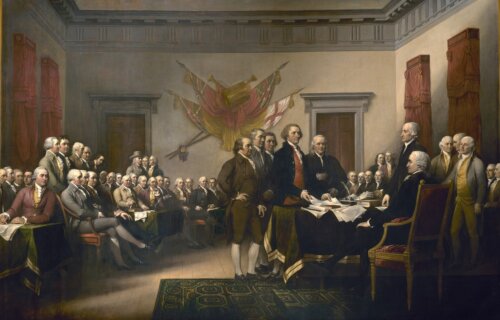NEW YORK — More than one in three Americans don’t know the true meaning of Independence Day. That’s according to a new OnePoll survey that tested the patriotic knowledge of 1,000 U.S. respondents, 99 percent of whom identified as either a born or naturalized citizen of the United States. When asked what July 4th is meant to officially commemorate, only 59 percent gave the correct answer: “The signing of the Declaration of Independence.”
Although 41 percent got the question wrong, 22 percent came close, choosing “The establishment of the United States as an independent nation.” Similarly, only 45 percent correctly picked the year the very first organized celebration of independence took place: 1777, a year after the Declaration of Independence was signed in 1776.
“At night there was a grand exhibition of fireworks (which began and concluded with thirteen rockets) on the Commons, and the city was beautifully illuminated,” The Pennsylvania Evening Post reported 246 years ago.
Where the rest of the survey was concerned, however, many respondents did well in their understanding of U.S. history and civics, answering a series of questions that are often used in the U.S. Citizenship Test. An encouraging 82 percent correctly answered that the “Commander in Chief” of the military is the President, and the same percentage (82%) identified the “Star Spangled Banner” as the title of the National Anthem.
Some basic civics lessons still eluded those polled. For example, only 65 percent knew that there are nine members of the Supreme Court, which is currently in session.
Four in 10 didn’t know that the “right to bear arms” is a part of the Second Amendment rather than the first – and 11 percent mistakenly believed that “freedom of speech” was not part of the First Amendment at all.
Prior to the OnePoll test, only 61 percent claimed to be very knowledgeable about U.S. history. At the end, 73 percent believed they got either most or all of the questions correct, suggesting that they were more confident in their abilities after the test.
Do schools need to put renewed emphasis on civics?
Although many Americans feel they have a good grasp on the rights and duties of citizenship, they’re probably not learning that information in schools. In 2020, researchers for the RAND Corporation found that the majority of social studies teachers don’t have the tools they need to teach children about civics.
According to the global policy think tank’s survey, just one in five social studies teachers in U.S. public schools feel prepared to teach civics. Most say they need more aid with instructional materials, professional development, and additional training.
Civics is the study of the rights, responsibilities, and duties of being a citizen. Along with learning about what it means to be a U.S. citizen, civics also teaches students about the need to respect the rights, beliefs, and opinions of others even if they may not agree with them.


I agree with this being mandatory in the schools but as well to teach what is corporatism, public and private.
LAW classifications (Sovereign, Admiralty, Maritime, Roman, etc…)
Lawfully vs. Legally, and the enforcement of company policy vs. Law.
This appalling ignorance of the above allows the line of Cain to live off of the backs of producers and others who use the production and commodities of the earth.
The Psycho / Socio bent of this world even though in the minority of the population, gravitate to positions of power and influence using the people of this planet as their livestock. I have high hopes the Tares of this world will be removed soon as it’s clear man can’t solve man’s problems.
1. The answer to the test question concerning the significance of July 4, 1776, is technically true but misleading. John Hancock, President of the Second Continental Congress, was the only signer of the Declaration of Independence on July 4, 1776. He signed the marked-up copy, which was sent to the printer that evening. Secretary of Congress Charles Thomson signed only as a witness. Virtually all of the 56 signatories signed the parchment copy of the Declaration when it was ready for signature on August 2, 1776. I would reword the exam answer to be “The approval of the Declaration of Independence.”
2. I would have excluded non-American-born citizens from the survey because naturalized citizens must take the citizens exam for naturalization. This gives them an unfair advantage in taking a test that they had to pass.
Submitted by Earl P. Williams, Jr., U.S. flag historian (paleovexillologist), Washington, D.C.